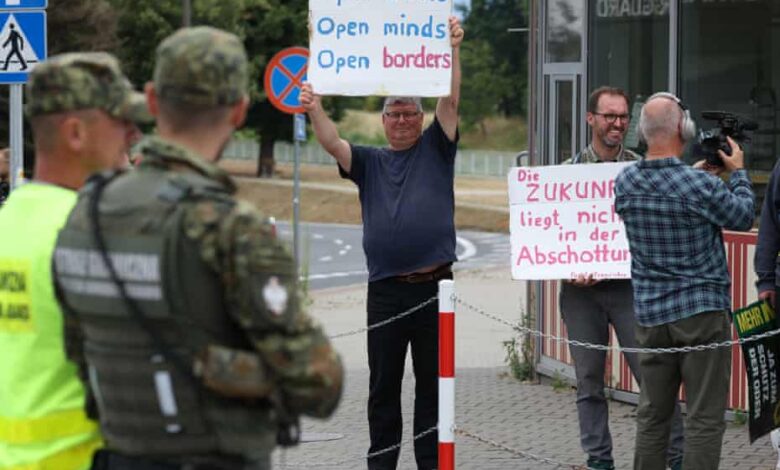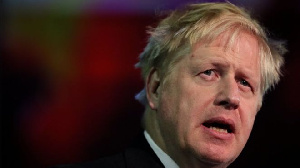Poland begins controls on borders with Germany and Lithuania

The measures came into force at midnight on Sunday and will last until 5 August, in the latest example of EU governments imposing measures that are straining the fabric of the bloc’s passport-free Schengen zone.
There have been far-right protests in Poland and anti-immigration campaigners have claimed that Germany is sending people to Poland despite them not having originally entered Germany via Poland, in contravention of EU rules. German authorities have denied this.
Poland’s controls are being carried out by hundreds of extra police officers and soldiers on 52 border crossings with Germany and 13 with Lithuania.
Germany introduced similar random checks on the Polish border in 2023. In May, shortly after the new government of Friedrich Merz took office, the German interior minister, Alexander Dobrindt, ordered more intensive controls which meant that asylum seekers could be turned back at the border, sparking controversy and triggering court challenges.
Dobrindt has called a summit on 18 July at which regional politicians are to discuss the challenges that are putting considerable strain on the Schengen zone. Under EU regulations, temporary border controls are allowed in order to address serious threats, but they can only be kept in place for a limited time.
On Monday, the Polish prime minister, Donald Tusk, said his government was made up of “supporters of … Europe without borders” but that they were operating in the interests of the entire EU.
“We are doing this for you, for the Germans, the Dutch, the French, because it’s the border of the European Union,” he said.
The interior minister, Tomasz Siemoniak, said the measures were necessary to prevent irregular migration through Poland. While the controls are only meant to last for 30 days, Siemoniak added: “If the Germans don’t remove their controls, we will continue with ours too.”
He said the problem had been exacerbated by the tightening of controls at the Poland-Belarus border, leading to rising numbers elsewhere. “We are seeing a significant increase in illegal migrants crossing the border into Lithuania, Latvia and then travelling to Poland,” he said.
For some time Poland has been warning against what it says is a Russian-Belarusian campaign to destabilise the EU and stoke the far right by incentivising irregular migration through the bloc’s eastern borders with Belarus.
Siemoniak said that just before the controls began at midnight, Polish border guards stopped an Estonian man attempting to smuggle four people, thought to be Afghan citizens, over the border. “This is exactly the proof we need as to how necessary these controls are,” he said.
Tusk said the same four people had been previously registered as attempting the illegal crossing from Belarus.
Tusk repeated his thinly veiled criticism of Germany, saying the new controls would allow the Polish authorities to scrutinise every case of a person being turned away by the German border force and pushed back into Poland.

“It will no longer be the case that anyone who has crossed the border illegally and whose documentation is incomplete or unclear will be sent to Poland from anywhere – whether from Germany or any other country,” Tusk said.
In Berlin, Merz’s spokesperson said: “The protection of borders against irregular migration is an interest that Germany has, that Poland has, that our European neighbours share with us. We do not want permanent border controls.”
Germany’s government commissioner for Poland, Knut Abraham, described the border controls as a “heavy burden” for the border region. “This is not a good day for German-Polish relations,” he said. “Intensifying controls at the German-Polish border will not be the solution to the migration problem.”
There is a lot at stake
The world’s most powerful man is using his office to punish journalistic organisations that won’t follow his orders or who report critically on his policies. Donald Trump’s actions against the press include bans, lawsuits and hand-picking his own pool of reporters.
But the global threat against the press is bigger than just Trump.
Economic and authoritarian forces around the globe are challenging journalists’ ability to report. An independent press, one that those in power can’t simply overrule, is crucial to democracy. Figures such as Trump and Hungary’s Viktor Orbán want to crush it through exclusion and influence.
The Guardian is a global news organisation that will stand up to attacks on the free press. We have no interest serving those with immense power or immense wealth.
We are owned by an independent trust devoted only to protecting and defending our journalism. That means we don’t have a billionaire owner dictating what our reporters can cover or what opinions our columnists can have, or shareholders demanding a quick return.
The global situation is shifting hour by hour, making this an extremely challenging moment. It will take brave, well-funded, committed, quality journalism to call out what is happening.
Our job is to make sure we do not get overwhelmed as Trump floods the zone. We must focus on the stories that will make the biggest impact on people’s lives, while holding the powerful to account. We’ll also continue to focus on the ideas people need to create a better world: a reason for hope.
As the writer and Guardian columnist Rebecca Solnit says: “authentic hope requires clarity … and imagination”.
The Guardian can provide both and, with the help of readers like you in South Africa, we can drive hope by reporting truthfully on what is happening and never pulling our punches.
Source: Katharine Viner





